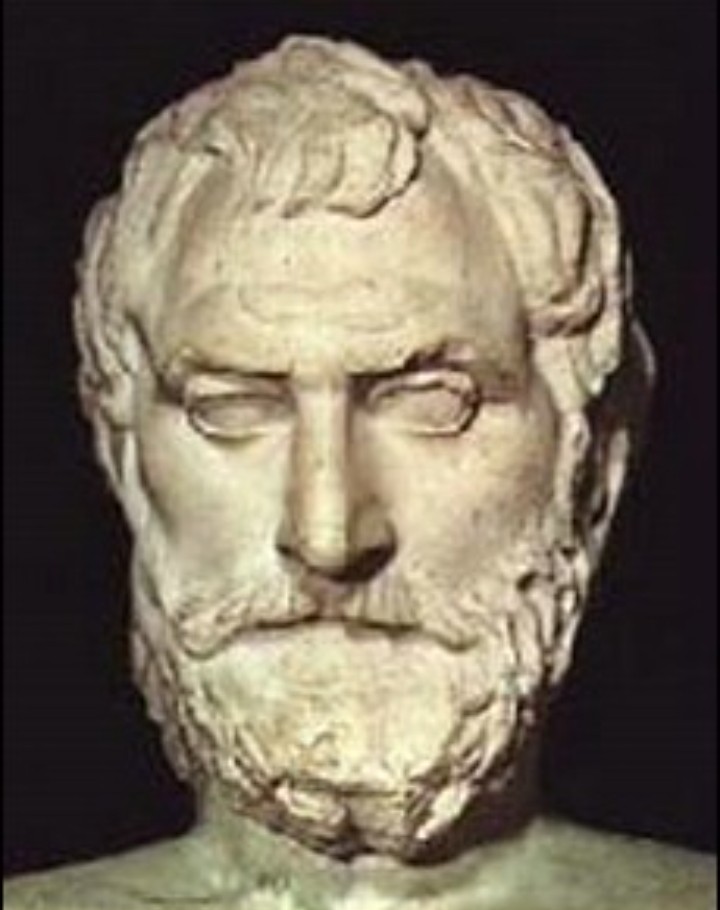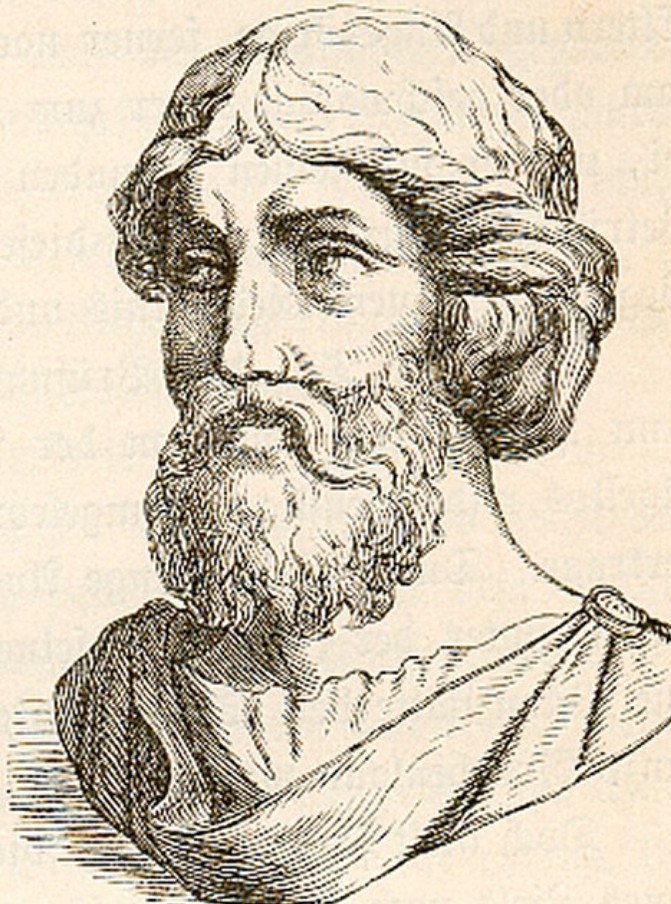The pre-Socratic era in ancient Greece, also known as the Milesian era, was a period of time from around 600 BCE to 400 BCE in which a group of philosophers sought to understand the nature of the world and its origins without relying on traditional religious or mythological explanations.
Since pre-Socratics were the first philosophers in the Western tradition, their ideas laid the foundation for developing Western philosophy and science.
During this era, several philosophers emerged and constructed their own ideas, each with their own distinctive perspective on the world, and named it “Natural Philosophy”.
Even though most of their work is lost and can only be retrieved through the writings of later times.
Thales: All is water
Thales of Miletus was a Pre-Socratic Philosopher who lived from around 624-546 BCE. He was one of the Seven Sages of Greece and is considered the first Western philosopher. He was known for his famous statement, “All is water,” which he used to explain the origin and nature of the world.

According to Thales, water was the basic element of everything, including the earth, air, and fire. All were derived from it. He believed that the world was alive and had a soul, and the world’s soul was in the form of water. Thales also attempted to explain natural phenomena such as earthquakes and eclipses in naturalistic terms rather than through myths and legends.
Moreover, the poet-philosopher Xenophanes asserted Thales’ prediction about the solar eclipse, which became a reason to stop the battle between the king Alyattes of Lydia and Cyaxares of Medes in 585 BCE.
However, modern-day philosophers did not believe that Thales could foretell the solar eclipse’s position and location.
Anaximander: Cyclical nature of history
Another pre-Socratic philosopher was Anaximander, who was a student of Thales and lived around (610-546 BCE). He was the first one to save his work in written form. He rejected Thales’s idea of “All is water” and proposed an initial formless state called “Apeiron,” which means “Infinite,” which then transformed into two opposite forms like wet and dry or hot and cold.

He was also believed to have produced the first map of the world. He also devised an equipment gnomon, a part of the sundial which had been used in China for two thousand years. He contributed in the field of mathematics, geography, and astronomy.
Furthermore, he believed that life on earth had originated from fish-like creatures that evolved over time.
Anaximander’s concept of the world as an infinite and eternal process planted a seed for maturing the idea of the cyclical nature of history in modern science.
Anaximenes: Air
Anaximenes was a student of Anaximander and lived between (585-525) BCE. He proposed that condensed and expanded air is a reason for the existence of everything. He presented the idea of compressing air, which becomes wind, clouds, and then later when it is more compressed. This was a significant theory as it proposed that reality could be measured.
Later on, his idea of compression and expansion of air was embraced by various philosophers.
Pythagoras: Harmony of the spheres
Pythagoras of Samos, who lived from around 570-497 BCE, is known for his contributions to mathematics and science and his philosophical ideas. He believed in the concept of a cosmic order or “harmony of the spheres,” in which planets and stars moved in a specific pattern, creating a piece of beautiful and harmonious music.

He also believed in the concept of metempsychosis, or the transmigration of souls; the soul was immortal and could be reincarnated into different life forms. Pythagoras also believed in the existence of divine intelligence, which he called the “Monad” that governed the Universe. He and his followers believed in the concept of mathematical harmony, which they saw as a fundamental principle of the universe.
Heraclitus: As above so, below
Heraclitus of Ephesus, who lived from around 540-480 BCE, was known for his concept of change and the idea of the unity of opposites. He believed that the world was in a constant state of flux and change and everything was in a state of becoming. He famously stated that
“You cannot step into the same river twice.”
Heraclitus also believed in the unity of opposites, stating that
“The way up and the way down are one and the same.”
He presented his theories in the form of riddles. Therefore, he became infamous among people by the name “ the obscure”. He had written his book in an esoteric manner on purpose so that only intelligent ones could understand his write-up and thus prevented himself from criticism by the ordinary men.
Pre-Socratic Atom Theory
Pre-Socratic atomists were a group of philosophers in ancient Greece who believed in the concept of atoms, or indivisible particles that make up all matter. These philosophers predate Socrates, who lived from 469-399 BCE, and their speculation became a base for the atomic theory in Western science.
One of the earliest pre-Socratic atomists was Leucippus, who lived in the 5th century BCE.
He was believed to have originated the concept of atoms, which he called “indivisible” particles. Leucippus posited that atoms were eternal and indestructible, and they moved in a void or empty space combined with various objects in the world. He also believed that atoms came in different shapes and sizes and combine in different ways to create different substances.
Another Pre-Socratic atomist was Democritus, who lived from 460-370 BCE. He was a student of Leucippus and proceeded with his work on atomic theory. Democritus proposed that atoms were indestructible and eternal, and homogeneous in nature. He believed that the properties of atoms, such as color, taste, and texture, were determined through their arrangements.
For instance, atoms of water are different than that of Iron.
Democritus also proposed that the universe was infinite and eternal and atoms were constantly moving and colliding to form new objects.
However, another Pre-Socratic philosopher called Zeno challenged his theory of atoms. He asked Democritus to provide an explanation for the void between atoms. He said if there is a void between atoms and the void is a thing, then what is between the atoms of the void, leaving Democritus confounded over his own theory.
Moreover, the pre-Socratic atomists were philosophers and natural scientists, and their ideas significantly influenced modern science’s development. Their concept of atoms as indivisible particles established an essential foundation for the atomic theory, which was further developed by philosophers such as Epicurus and Lucretius in the Hellenistic period, and by scientists such as John Dalton in the 19th century.
In conclusion, the pre-Socratic era was a significant period in Western philosophy and science development. Thales of Miletus, Anaximander, Anaximenes, Pythagoras, Heraclitus, and the Atomists are some of the most prominent figures of this era, each with their own unique perspective about the world.
However, it is significant to note that the pre-Socratic era was a time of great philosophical thought and political, social, and economic changes in ancient Greece. The philosophers were not isolated from these changes but were also influenced by them.
Hence, these philosophers challenged traditional religious and mythological explanations of the world and proposed new ideas and perspectives on the nature of the world and its origins that continue to influence our understanding of the world today.
References:
Also, Read: Scientific advancement in the Islamic golden age
Syeda Ambreen Zafar is a software engineer. She’s very keen in space sciences amd astronomy. She mostly writes on Space Science, social issues and conspiracy theories. She loves to write fictional stories on horror, mystery and suspense.

